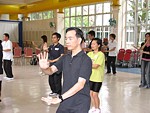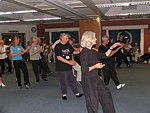My Perspective in Facilitating Workshops
Dr Pamela Kircher
In an effort to answer many enquiries about our training workshops, Dr Pamela Kircher, the president of the Tai Chi Association of America, writes an article explaining how we facilitate these workshops. Her view represents that of the Master Trainers.
MY PERSPECTIVE AS A MASTER
TRAINER ON FACILITATING INSTRUCTORS’ WORKSHOPS
Pam Kircher MD

Hence, my goals in an Instructors’ workshop are to train instructors who are skilled not only at Tai Chi but also at working with this unique population. Because of the goals of the workshop, both skilled Tai Chi instructors and also physical therapists and other health care professionals are invited to participate in the instructors’ workshops.
As a facilitator of trainings,
I have found that the big challenge with traditional instructors is to help
them understand what it is like to have arthritis and/or diabetes and the physical
and psychological limitations that people have when they enter their classes.
Precautions are a huge part of the program and it is difficult for someone who
is very physically fit and who has never worked with people with chronic illness
to appreciate the need for those “extreme” precautions. For example, at a recent
instructors’ training, a participant who is also a rheumatologist gave a demonstration
about how fully a person with severe arthritis would be able to participate
in the warm-up exercises. It was very eye opening to the class to understand
that level of disability.
Equally challenging as a facilitator is introducing physical therapists and health care professionals to Tai Chi forms and Tai Chi principles. That group of people really understand chronic illness and its limitations and are very aware of precautions, but they need a lot of attention placed on Tai Chi itself. Teaching the form to them is considerably more challenging than it is to people with a strong Tai Chi background. Giving them an appreciation of the rich and varied background of Tai chi and its important principles is also a challenge. These participants usually need to practice the form for awhile before they feel comfortable teaching it to anyone. It is quite useful if they can “buddy up” with someone in their area that is in the workshop as well. Using the video and practicing with a buddy usually builds their skill and confidence rather quickly so that they will be ready to teach in a few months.

Honoring the skills of the seasoned Tai Chi instructor and the wisdom of the health care practitioner in an instructors’ workshop while supporting each participant in learning the basics of the Tai Chi for Arthritis and Tai Chi for Diabetes programs certainly requires awareness, focus, tact, and dedication on my part!

